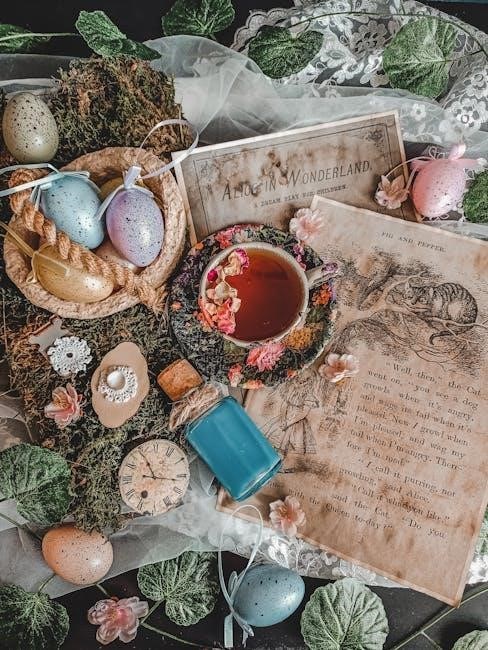The Brief Wondrous Life of Oscar Wao is a Pulitzer Prize-winning novel by Junot Díaz, blending Dominican culture, identity, and a vibrant narrative style․
1․1 Overview of the Novel and Its Significance
The Brief Wondrous Life of Oscar Wao by Junot Díaz is a groundbreaking novel that blends Dominican culture, identity struggles, and a unique narrative voice․ The story follows Oscar de León, a young Dominican-American man in New Jersey, grappling with his cultural heritage and a cursed family history․ Díaz’s vivid prose, infused with slang and Spanglish, captures the complexities of the immigrant experience․ The novel’s significance lies in its exploration of identity, family, and history, making it a pivotal work in contemporary literature․ Its innovative style and deep emotional resonance have solidified its place as a modern classic․
1․2 The Pulitzer Prize and Its Impact on the Novel’s Popularity
The Pulitzer Prize for Fiction in 2008 catapulted The Brief Wondrous Life of Oscar Wao to national and international acclaim․ This prestigious award significantly boosted the novel’s visibility, attracting a broader audience and sparking widespread critical praise․ The recognition not only solidified Junot Díaz’s reputation as a major literary voice but also highlighted the importance of diverse storytelling in contemporary literature․ The prize-driven attention led to increased sales and discussions, cementing the novel’s status as a modern classic and a defining work of the Dominican-American experience․

Chapter 1: “Ghetto Nerd at the End of the World (1974-1987)”
This chapter introduces Oscar de León, a Dominican-American youth struggling with identity and cultural expectations in 1980s New Jersey, highlighting his nerdy obsessions and personal challenges․
Oscar de León is a young Dominican-American boy growing up in Paterson, New Jersey, during the 1970s and 1980s․ He is an overweight, self-proclaimed “ghetto nerd” with a deep passion for science fiction, fantasy, and comic books․ Oscar’s world is shaped by his struggles with identity, cultural expectations, and his desire to fit in․ His family, including his strict mother and rebellious sister Lola, plays a central role in his life․ Oscar’s story is one of resilience and self-discovery in a world that often seems hostile to his ambitions and dreams․
2․2 The Narrative Voice and Style of Junot Díaz
Junot Díaz’s narrative voice in The Brief Wondrous Life of Oscar Wao is dynamic and layered, blending slang, Spanglish, and a rich, poetic prose․ The narrator, often identified as Yunior, delivers a raw, conversational tone that mirrors the vibrancy of Dominican culture․ Díaz’s style seamlessly weaves together science fiction, fantasy, and Caribbean folklore, creating a unique literary experience․ His use of language reflects the hybrid identity of his characters, capturing their struggles and resilience with both humor and depth; This narrative approach immerses readers in Oscar’s world, making it unforgettable and deeply relatable․
Themes in Chapter 1
3․1 Identity Crisis and Cultural Struggles

Oscar’s struggle to reconcile his Dominican heritage with his American upbringing is central, highlighting the challenges of cultural identity and belonging․
3․2 The Concept of the Curse (Fukú)
The chapter introduces the notion of a familial curse, exploring its impact on Oscar’s life and the broader themes of destiny and heritage․
Oscar’s identity crisis stems from his Dominican heritage and American surroundings, creating a clash of cultures․ His physical appearance and nerd persona alienate him within both worlds, making societal acceptance difficult․ This struggle reflects the broader challenges faced by first-generation immigrants, caught between preserving their roots and assimilating into a new society․ The novel vividly portrays Oscar’s internal conflict through his obsession with science fiction and fantasy, which serves as an escape from his reality․ This duality of identity is a recurring theme, shaping Oscar’s journey and self-perception profoundly․
The curse, or fukú, is a central theme in Oscar’s story, representing a generational burden of misfortune․ Originating from African and Indigenous Taino traditions, the curse is tied to historical traumas like slavery and colonialism․ It manifests in the de León family through tragedy, heartbreak, and unexplained suffering․ Oscar believes the curse explains his family’s ill fate, shaping his worldview and destiny․ This supernatural element intertwines with the novel’s realistic portrayal of identity and culture, creating a unique narrative blend that explores both personal and collective histories․

Character Analysis
Oscar’s struggles are both physical and emotional, reflecting his identity crisis․ His weight and cultural expectations create a mismatch, while his love for sci-fi offers escape and defines his character․
4․1 Oscar’s Physical and Emotional Struggles
Oscar’s physical appearance and emotional turmoil are central to his character․ His weight makes him a target for bullying, while his love for science fiction and fantasy serves as an escape from his harsh reality․ The novel portrays Oscar’s struggle to reconcile his Dominican heritage with his American upbringing, leading to a deep identity crisis․ His emotional struggles are exacerbated by feelings of isolation and unrequited love, making him a profoundly relatable and tragic figure․ His inner conflict reflects the broader challenges of cultural assimilation․
4․2 The Role of Lola in Oscar’s Life
Lola, Oscar’s sister, plays a pivotal role in his life, offering both support and complexity․ Her rebellion and independence contrast with Oscar’s introverted nature, creating a dynamic tension․ Lola’s experiences and decisions often influence Oscar’s perspective, particularly in navigating cultural expectations and personal identity․ Despite their differences, she remains a significant figure in his emotional landscape, highlighting themes of sibling bond and mutual understanding amidst their shared struggles․ Her presence underscores the novel’s exploration of family ties and individual aspirations․
Historical and Cultural Context
The Brief Wondrous Life of Oscar Wao bridges Dominican culture and the American immigrant experience, exploring themes of identity, displacement, and the weight of historical legacy․
5․1 The Dominican Republic’s History and Its Influence
The Brief Wondrous Life of Oscar Wao deeply explores the Dominican Republic’s tumultuous history, particularly under Rafael Trujillo’s oppressive regime, which shaped the nation’s identity․ The novel reflects the cultural and political struggles of Dominicans, blending folklore and historical events․ This history influences Oscar’s family, highlighting their resilience and the intergenerational impact of colonialism and dictatorship․ The Dominican Republic’s legacy of resistance and migration is central to the story, tying Oscar’s personal struggles to the broader cultural narrative of his heritage․
5․2 The Immigrant Experience in New Jersey
Oscar’s story reflects the challenges of Dominican immigrants in New Jersey, navigating cultural displacement and identity․ The novel portrays the struggles of adapting to a new environment, where traditional values clash with American norms․ Oscar’s family faces societal marginalization and internal conflicts, emphasizing the complexities of assimilation․ Díaz’s vivid portrayal of their experiences in Paterson, NJ, highlights the resilience and hybrid identity of immigrants, blending their Caribbean roots with American life, creating a unique cultural landscape that shapes Oscar’s worldview and struggles․

Symbolism and Literary Devices
The Brief Wondrous Life of Oscar Wao employs rich symbolism, blending science fiction and fantasy elements with Spanglish, reflecting cultural identity and the characters’ complex inner worlds․
6․1 The Use of Science Fiction and Fantasy Elements
In The Brief Wondrous Life of Oscar Wao, Junot Díaz seamlessly blends science fiction and fantasy elements, reflecting Oscar’s obsession with genre fiction․ These elements mirror his inner world, where imagination serves as both escape and refuge․ The narrative often juxtaposes futuristic, otherworldly imagery with the harsh realities of Oscar’s life, creating a unique storytelling style․ This blending of genres not only highlights Oscar’s geek identity but also serves as a metaphor for the broader cultural and familial struggles, such as the curse of fukú, that shape his destiny․
6․2 The Significance of Slang and Spanglish
In The Brief Wondrous Life of Oscar Wao, Junot Díaz employs slang and Spanglish to reflect the hybrid identity of Dominican-American characters․ This linguistic blend mirrors their cultural duality, bridging the gap between their Dominican heritage and American upbringing․ The use of informal language and code-switching creates authenticity, making the narrative feel raw and personal․ It also serves to preserve cultural heritage while adapting to a new environment, highlighting the characters’ struggles and triumphs in navigating multiple identities through language․

The First Chapter’s Role in the Novel
The first chapter introduces Oscar and sets the tone, establishing themes like identity and the curse, while laying the groundwork for the rest of the story․
7․1 Setting the Tone for the Rest of the Story
The first chapter of The Brief Wondrous Life of Oscar Wao masterfully sets the tone for the novel, introducing Oscar de León and his vibrant, yet troubled, world․ Through its energetic narrative style, blending slang, Spanglish, and cultural references, the chapter establishes a balance of humor and pathos․ It introduces key themes like identity struggles and the curse, while also showcasing the immigrant experience and the clash of cultures․ This dynamic introduction creates a cohesive narrative voice that engages readers and prepares them for the unfolding story․
7․2 Introducing Key Themes and Motifs
The first chapter of The Brief Wondrous Life of Oscar Wao introduces central themes such as identity crisis and cultural displacement․ Oscar’s struggles with his Dominican heritage and American upbringing highlight the tension between tradition and modernity․ The concept of the fukú curse is also introduced, tying the family’s misfortunes to their history․ Additionally, the chapter explores the immigrant experience and the challenges of belonging, while incorporating motifs like science fiction and fantasy, which reflect Oscar’s escapism and imagination․ These elements create a rich foundation for the novel’s exploration of identity, culture, and destiny․
